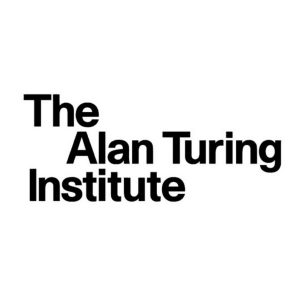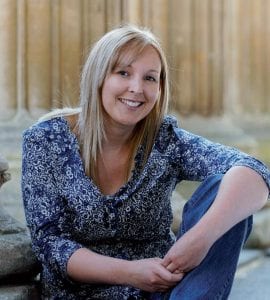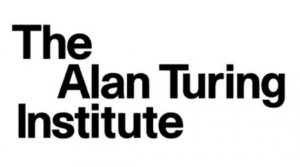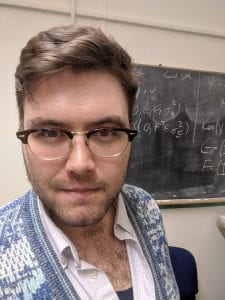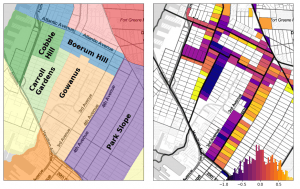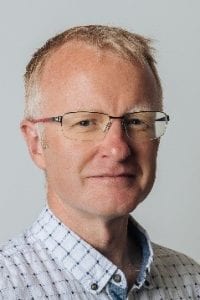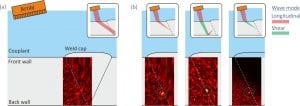Our latest series of blogs introduces you to our University of Bristol’s Turing Fellows, where the Jean Golding Institute have been speaking to some of the thirty Alan Turing Institute Fellows to find out a little more about their work and research interests.
Last time we spoke to Genevieve Liveley, Reader in Classics and Turing Fellow who spoke to us about her work in narratology and the ancient and future (hi)stories of AI and robots – you can read more about her on our previous JGI blog.
Next, we spoke to Philip Hamann, NIHR Clinical Lecturer in Rheumatology and Turing Fellow at the University of Bristol.
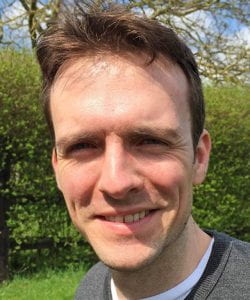
JGI: What are your main research interests?
My research interests centre on developing artificial intelligence (AI) methods to monitor and manage individuals with rheumatoid arthritis remotely using remotely captured data from smartphones and wearables.
Can you give a brief background of your experience?
I am an academic rheumatologist with over 8 years specialist rheumatology experience. I completed my PhD working on data from the British Society for Rheumatology Biologics Register. This is the worlds largest longitudinal database of patients with rheumatoid arthritis who take some of the new high-cost drugs we use to treat rheumatoid arthritis. I examined the data to see if there were any associations between the demographics of patients and how they responded to these drugs over time. I used latent class trajectory modelling and Bayesian methodology to plot the outcomes of patients over time. Whilst undertaking my PhD, I conceptualised and developed an award-winning smartphone app and cloud-based software in collaboration with industry partners which allows patients to securely record and report rheumatoid arthritis disease activity using validated patient reported outcomes which is now in clinical use in the NHS. I am now working on a project to use the app to try to predict flares remotely and optimise when patients are seen in clinic.
What are the big issues related to data science / data-intensive research in your area?
The really big issues in health data science research are around data security, patient confidentiality, ethical algorithms, safety and reproducibility of results. When working with patient sensitive data that influences clinical care, findings must be safe, fair and reliable. The trust in the doctor-patient relationship is central to being able to deliver best care. Therefore, any research and industry partnership needs to adhere to the highest research and ethical standards and ensure potential issues are identified at the beginning and addressed. Transposing these core values and standards into research using novel remote monitoring services that involve cloud computing and AI, presents new challenges that need to be understood and tackled up-front, which is something we’ve been working on from day one.
Can you tell us of one recent publication in the world of data science or data-intensive research that has interested you?
A recent and important paper published in Sensors from the end of 2017 is of great interest. Developing Fine-Grained Actigraphies for Rheumatoid Arthritis Patients from a Single Accelerometer Using Machine Learning. Sensors (Basel). 2017 Sep;17(9):2113–22. Andreu-Perez J et al.
In this study, the authors describe specific activity traces that are able to identify, with a high level of accuracy, different day-to-day activities being undertaken by people with rheumatoid arthritis and differentiate these from traces from health volunteers using a single accelerometer. These findings represent a significant proof-of-concept of how remote monitoring with wearables could be used for patients with RA.
How interdisciplinary is your research?
As with most research in healthcare, my research is very interdisciplinary and involves working with clinical staff and patients who use the app in the NHS, academics who are working with me to develop our next research study and industrial partners who build, develop and maintain the app. One thing I’ve learnt when working across disciplines and with patients is the importance of getting feedback from users of the app and avoiding jargon, making sure everyone understands everyone else, and understanding the differing objectives of different members of the team. An essential rule in multidisciplinary teams is to pause, recap and check everyone understands before proceeding to avoid difficulties later.
What’s next in your field of research?
Developments in healthcare are at a really exciting point right now. Wearable technology is becoming mainstream, smartphones are now more powerful than computers from just 2-3 years ago (and are affordable and widely used) and mobile data infrastructure is now robust, covering the vast majority of the UK. The tremendous advances in AI methodology means that the data collected from this widely available hardware can be synthesised in a manageable way, bringing with it the possibilities of remote sensing and personalised real-time adaptive healthcare. Taken together with the open approach to innovation being championed in the NHS, the possibilities for the new models of care to make a difference to patients may not be that far off.
If anyone would like to get in touch to talk to you about collaborations / shared interests, how can they get in touch?
Email is best: Philip.Hamann@bristol.ac.uk
_________________________________________________________________________________________________________________________________________________________________
Thirty fellowships and twelve projects have been awarded to Bristol as part of the University partnership with the Turing. This fellowship scheme allows university academics to develop collaborations with Turing partners. The Fellowships span many fields including key Turing interests in urban analytics, defence and health.
Take a look at the Jean Golding Institute website for a full list of University of Bristol Turing Fellows.
The Alan Turing Institute
The Alan Turing Institute’s goals are to undertake world-class research in data science and artificial intelligence, apply its research to real-world problems, drive economic impact and societal good, lead the training of a new generation of scientists and shape the public conversation around data.


